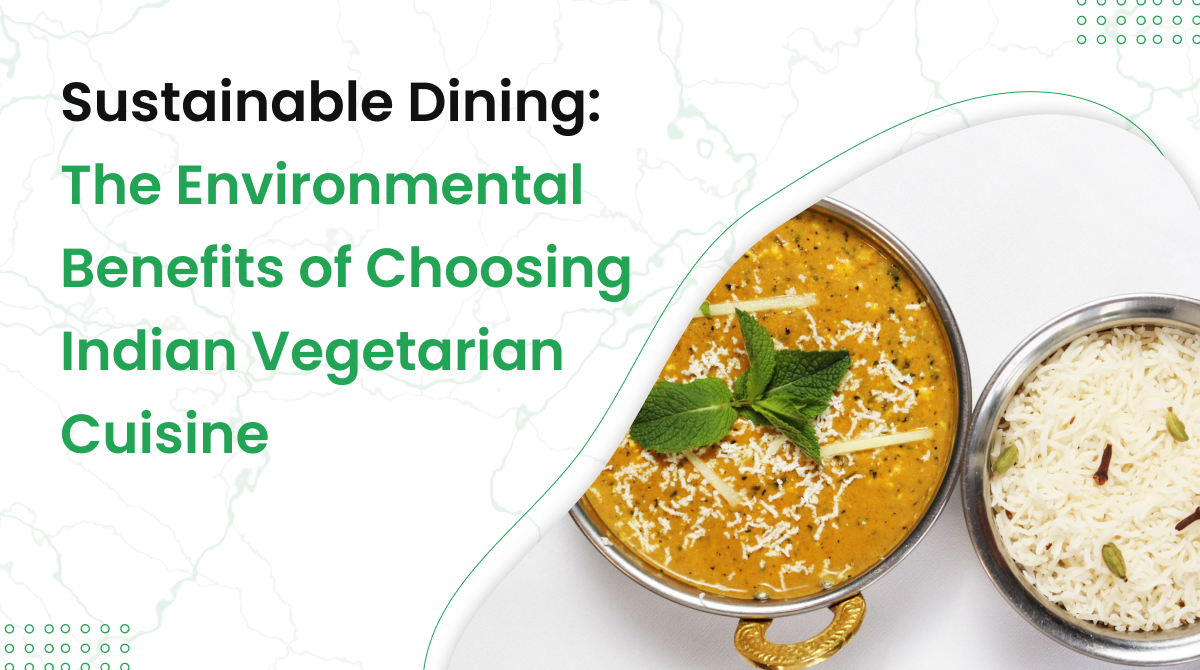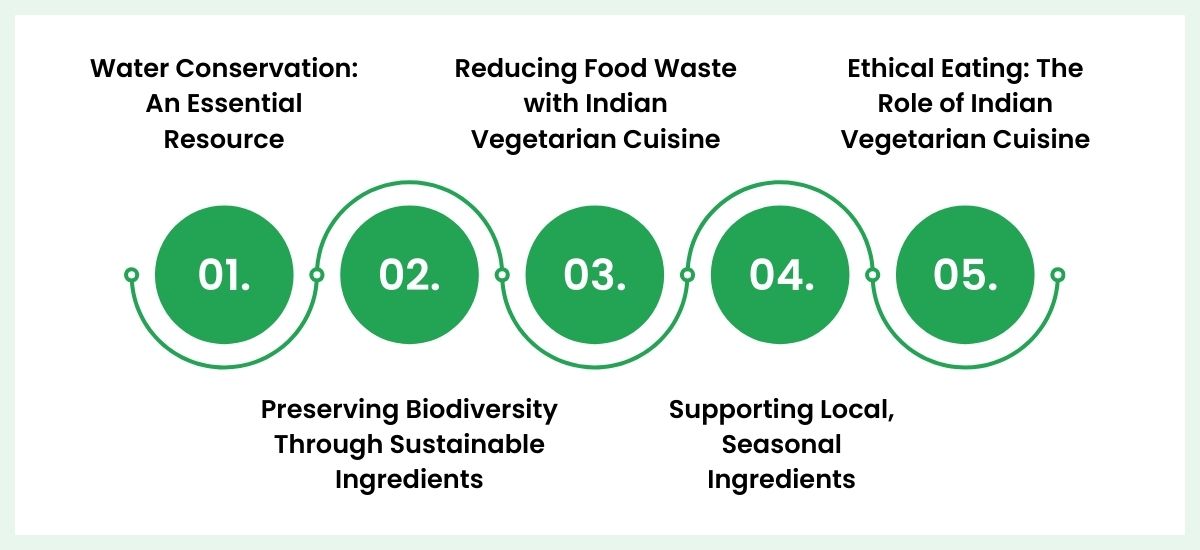In an age where sustainability is becoming a top priority for many, food choices play a significant role in reducing our environmental impact. As more people strive to make eco-conscious decisions in every aspect of their lives, dining habits are also evolving. One of the most impactful ways to contribute to a greener future is by embracing a plant-based diet, and what better way to do this than through the rich and vibrant offerings of Indian vegetarian cuisine?

At HariMoksh Restaurant, located in the heart of Berlin, we are proud to offer an array of flavorful and sustainable vegetarian dishes that not only celebrate the incredible diversity of Indian cuisine but also promote environmental sustainability. In this blog, we will explore the environmental benefits of choosing Indian vegetarian food, from reducing carbon footprints to supporting ethical food practices.
Lower Carbon Footprint with Plant-Based Ingredients
One of the most compelling reasons to choose vegetarian meals is the significant reduction in carbon emissions. The production of animal-based products is responsible for a large percentage of greenhouse gas emissions, particularly methane, which contributes to global warming. On the other hand, plant-based foods—such as the lentils, legumes, and vegetables featured prominently in Indian vegetarian cuisine—require far fewer resources to grow.

We, at our restaurant, serve dishes like dal tadka, aloo gobi, and chana masala, which are made from locally sourced, fresh vegetables and legumes. These ingredients not only provide a burst of nutrition but also help reduce the environmental toll of food production. By focusing on plant-based dishes, we actively participate in minimizing the environmental impact of our food system.
Water Conservation: An Essential Resource
Water is one of the most precious resources on the planet, yet the production of animal products requires vast amounts of water—sometimes thousands of liters for just one kilogram of meat. In comparison, growing vegetables, grains, and legumes for vegetarian meals consumes far less water.
Indian vegetarian cuisine, rich in ingredients like paneer (Indian cheese), chickpeas, and spinach, uses far less water in its production. By choosing plant-based Indian meals at HariMoksh, you are helping conserve water resources. Dishes such as saag paneer or baingan bharta (smoked eggplant curry) are both delicious and water-efficient, allowing you to enjoy a meal while making a positive contribution to water conservation.
Preserving Biodiversity Through Sustainable Ingredients
Another key benefit of choosing Indian vegetarian food is the role it plays in preserving biodiversity. Animal farming is a leading cause of deforestation and habitat destruction, as forests are cleared to make room for grazing land or to grow animal feed. In contrast, plant-based farming has a much smaller environmental footprint, requiring less land and promoting a more sustainable use of natural resources.
We are committed to sourcing ingredients that are not only locally grown but also support sustainable farming practices. Our chefs create dishes using seasonal vegetables, pulses, and grains—ingredients that are grown with minimal impact on the environment. For instance, our vegetable biryani and mutter paneer (peas and paneer curry) use fresh, seasonal vegetables, helping to preserve local ecosystems while delivering rich and flavorful dishes.
Reducing Food Waste with Indian Vegetarian Cuisine
Indian cuisine is also known for its emphasis on utilizing every part of the vegetable, which reduces food waste. From sambar (lentil stew) to kadhi pakora (fried gram flour dumplings in yogurt curry), Indian dishes often incorporate leftovers or use vegetables in their entirety. This resourceful cooking technique reduces waste and promotes a more sustainable dining experience.
At HariMoksh, we strive to follow these principles by using every part of the ingredient and ensuring that nothing goes to waste. By choosing our vegetarian dishes, you’re helping reduce the environmental burden of food waste. Furthermore, we work to minimize packaging and offer options for eco-friendly takeout containers to ensure that our commitment to sustainability extends beyond the kitchen.
Supporting Local, Seasonal Ingredients
A key tenet of Indian vegetarian cuisine is its reliance on seasonal, locally grown produce. This not only enhances the flavors of the dishes but also reduces the environmental impact associated with long-distance food transportation. Seasonal eating encourages the consumption of ingredients that are naturally abundant, which means less energy and fewer resources are used in production.
We proudly offer dishes made with seasonal ingredients, supporting local farmers and reducing the carbon footprint of our food. Whether it’s fresh tomatoes, locally grown leafy greens, or seasonal root vegetables, we make sure that our menu reflects the best of what the season has to offer. By enjoying a meal at our restaurant, you’re also supporting sustainable farming practices that help maintain the balance of our ecosystems.
Ethical Eating: The Role of Indian Vegetarian Cuisine
Beyond the environmental benefits, Indian vegetarian food is often rooted in ethical eating practices. For centuries, many regions of India have embraced vegetarianism as a way of life, driven by cultural and religious beliefs that emphasize compassion and respect for all living beings. By choosing vegetarian food, you’re aligning with these principles of non-violence (ahimsa), making your dining experience not only environmentally conscious but ethically grounded.
HariMoksh embraces this philosophy by offering a menu that is free from meat, focusing on plant-based ingredients that are both nutritious and ethical. Our dishes like vegetable korma and dal makhani are prepared with love and care, adhering to the tradition of ethical cooking that supports sustainable food systems.
Conclusion: Make a Difference with Every Bite
Choosing Indian vegetarian cuisine is not only a delicious and healthy way to enjoy a meal, but it’s also a choice that benefits the environment. By opting for plant-based dishes, such as those offered at HariMoksh, you are helping reduce greenhouse gas emissions, conserve water, and support ethical farming practices. Our commitment to sustainability is reflected in every dish we serve, from the use of seasonal ingredients to our zero-waste approach in the kitchen.
So, the next time you dine with us, know that your choice isn’t just satisfying your hunger—it’s making a positive impact on the planet. Sustainable dining has never been so flavorful, and with the rich and diverse offerings of Indian vegetarian cuisine, you’re not only nurturing your body but also contributing to a healthier, more sustainable world.
Join us at HariMoksh for a meal that’s good for the soul and kind to the planet
At Hari Moksh, we are dedicated to offering dishes that not only tantalize your taste buds but also promote a sustainable future. By choosing our vegetarian cuisine, you’re making a conscious decision to support environmental well-being. Join us in this journey towards sustainability.
Stay connected with us on social media:
- Instagram: @harimoksh.restaurant
- Facebook: HariMoksh Restaurant
For more information on sustainable dining options, visit Foodmato.

